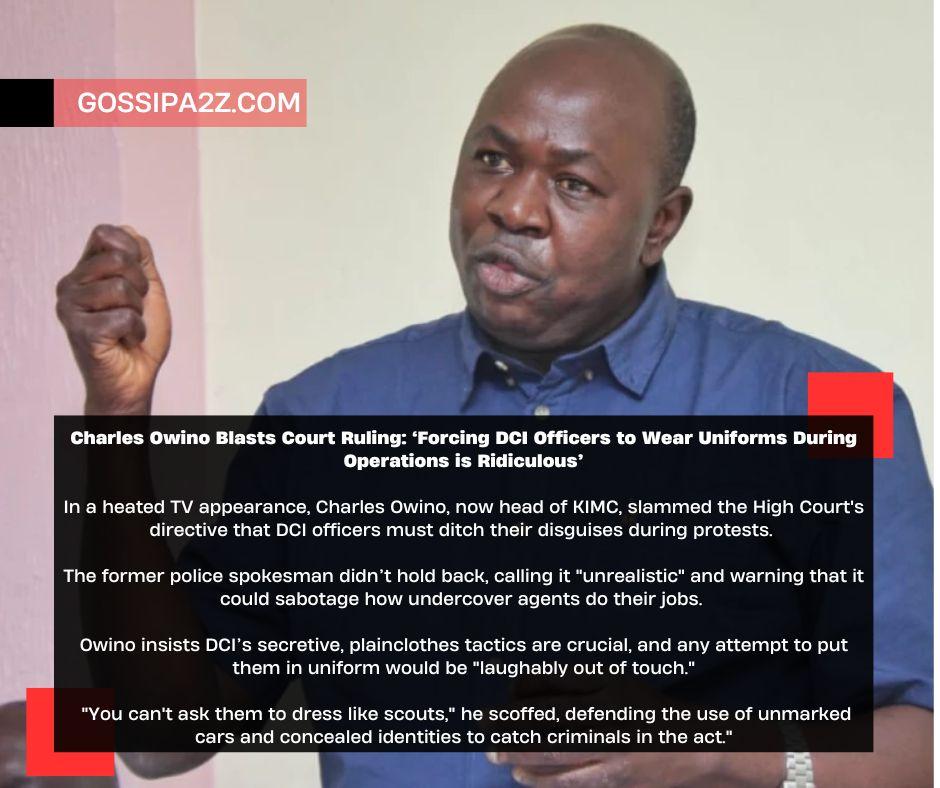Police Insider: Court’s Plainclothes Protest Ban ‘Unenforceable’
Kenyans will continue to witness plainclothes police officers and unmarked vehicles at protests, despite a court ruling prohibiting such practices, as disclosed by former police spokesperson Charles Owino on Thursday.
Owino’s comments, made during a Citizen TV interview, highlight the difficulties in enforcing the recent court decision.
On Wednesday, High Court Judge Bahati Mwamuye ordered the Inspector General (IG) of the National Police Service to prevent plainclothed officers from masking their faces or obscuring vehicle identification during protests.
This ruling came after a petition from the Law Society of Kenya (LSK), which claimed that the presence of unidentified officers instills fear in protesters and undermines accountability.
Owino, however, expressed doubts about the practicality of these orders. He argued that the Directorate of Criminal Investigations (DCI) cannot be expected to change its covert operational methods, such as wearing uniforms or using marked vehicles.
The former spokesperson underscored that the use of civilian vehicles by DCI officers is routine.
Owino clarified that DCI officers typically rely on civilian vehicles, not unmarked ones, explaining, “They use civilian plate vehicles, which is a standard procedure.”
His remarks reflect the ongoing tension between the judiciary’s demand for transparency and the operational needs of the police.
Owino reiterated that DCI officers will continue operating in plainclothes and unmarked vehicles as part of their regular procedures, questioning how the court’s orders could be realistically enforced.

He further emphasized the importance of DCI involvement in controlling protests, especially when criminal elements might infiltrate peaceful gatherings.
Owino explained that if criminal elements are involved, DCI officers are necessary to support those managing the situation.
In such cases, he argued, DCI officers need to operate covertly and maintain the use of unmarked vehicles.
ALSO READ:
- Kenya Owes Chebukati a Hero’s Farewell for ‘Saving’ Democracy – MP Declares
- HELLFIRE HORROR: Worshippers in Bomet Torch Granny Alive in ‘Satanic Purge’ Ritual(Video)
- Haitian Police Caught in Explosive Feud with Kenyan Peacekeepers? Officials Scramble to Deny Rift
- Raila Odinga’s 2027 Options After Shocking AUC Defeat
- Congo Frees Opposition Leader and Former President’s Ally Jean-Marc Kabund
While the court’s directive aims to protect citizens’ rights and prevent abuses, Owino pointed out that certain aspects, like the use of tear gas masks and operational gear, may complicate compliance.
He acknowledged that officers might wear tear gas masks during operations, but also mentioned that wearing name tags is reasonable.
However, he noted that jungle uniforms, commonly worn during operations, are not designed to display name tags.
Owino did acknowledge that the court’s ruling could be driven by instances where rogue police officers, particularly in abductions, violated the law.
The Kenya National Human Rights Commission (KNHCR) has documented 34 abductions and 61 deaths since protests began in June.
He suggested that concerns over such misconduct might be the reason for the court’s intervention.
The debate around police conduct during demonstrations is a long-standing issue in Kenya.
The LSK, represented by advocate Dudley Ochiel, argued that unidentified officers frequently use excessive force because they cannot be easily held accountable.
Ochiel told the court that without transparency, these officers tend to act with impunity, urging for more stringent oversight.
Police Insider: Court’s Plainclothes Protest Ban ‘Unenforceable’
